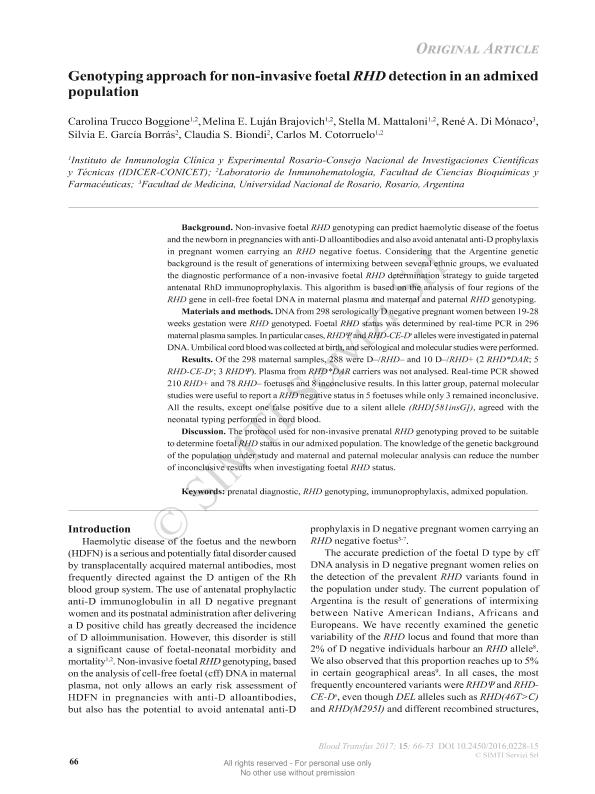Artículo
Genotyping approach for non-invasive fetal RHD detection in an admixed population
Trucco Boggione, Carolina ; Luján Brajovich, Melina Eliana
; Luján Brajovich, Melina Eliana ; Mattaloni, Stella Maris
; Mattaloni, Stella Maris ; Di Monaco, Rene A.; García Borrás, Silvia Estela; Biondi, Claudia Silvia; Cotorruelo, Carlos Miguel
; Di Monaco, Rene A.; García Borrás, Silvia Estela; Biondi, Claudia Silvia; Cotorruelo, Carlos Miguel
 ; Luján Brajovich, Melina Eliana
; Luján Brajovich, Melina Eliana ; Mattaloni, Stella Maris
; Mattaloni, Stella Maris ; Di Monaco, Rene A.; García Borrás, Silvia Estela; Biondi, Claudia Silvia; Cotorruelo, Carlos Miguel
; Di Monaco, Rene A.; García Borrás, Silvia Estela; Biondi, Claudia Silvia; Cotorruelo, Carlos Miguel
Fecha de publicación:
01/2017
Editorial:
SIMTI Servizi Sri
Revista:
Blood Transfusion
ISSN:
1723-2007
Idioma:
Inglés
Tipo de recurso:
Artículo publicado
Clasificación temática:
Resumen
Background. Non-invasive foetal RHD genotyping can predict haemolytic disease of the foetus and the newborn in pregnancies with anti-D alloantibodies and also avoid antenatal anti-D prophylaxis in pregnant women carrying an RHD negative foetus. Considering that the Argentine genetic background is the result of generations of intermixing between several ethnic groups, we evaluated the diagnostic performance of a non-invasive foetal RHD determination strategy to guide targeted antenatal RhD immunoprophylaxis. This algorithm is based on the analysis of four regions of the RHD gene in cell-free foetal DNA in maternal plasma and maternal and paternal RHD genotyping. Materials and methods. DNA from 298 serologically D negative pregnant women between 19-28 weeks gestation were RHD genotyped. Foetal RHD status was determined by real-time PCR in 296 maternal plasma samples. In particular cases, RHDΦ and RHD-CE-Ds alleles were investigated in paternal DNA. Umbilical cord blood was collected at birth and serological and molecular studies were performed. Results. Of the 298 maternal samples, 288 were D-/RHD- and 10 D-/RHD+ (2 RHD∗DAR; 5 RHD-CE-Ds; 3 RHDΦ). Plasma from RHD∗DAR carriers was not analysed. Real-time PCR showed 210 RHD+ and 78 RHD-foetuses and 8 inconclusive results. In this latter group, paternal molecular studies were useful to report a RHD negative status in 5 foetuses while only 3 remained inconclusive. All the results, except one false positive due to a silent allele (RHD[581insG]), agreed with the neonatal typing performed in cord blood. Discussion. The protocol used for non-invasive prenatal RHD genotyping proved to be suitable to determine foetal RHD status in our admixed population. The knowledge of the genetic background of the population under study and maternal and paternal molecular analysis can reduce the number of inconclusive results when investigating foetal RHD status.
Palabras clave:
PRENATAL DIAGNOSTIC
,
RHD GENOTYPING
,
IMMUNOPROPHYLAXIS
Archivos asociados
Licencia
Identificadores
Colecciones
Articulos(CCT - ROSARIO)
Articulos de CTRO.CIENTIFICO TECNOL.CONICET - ROSARIO
Articulos de CTRO.CIENTIFICO TECNOL.CONICET - ROSARIO
Citación
Trucco Boggione, Carolina; Luján Brajovich, Melina Eliana; Mattaloni, Stella Maris; Di Monaco, Rene A.; García Borrás, Silvia Estela; et al.; Genotyping approach for non-invasive fetal RHD detection in an admixed population; SIMTI Servizi Sri; Blood Transfusion; 15; 1; 1-2017; 66-73
Compartir
Altmétricas



